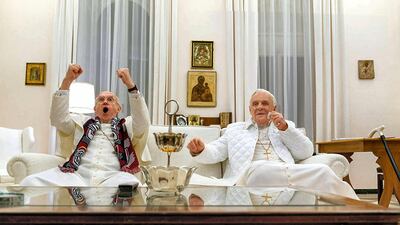The Two Popes is the perfect Christmas movie for our doubting times. It is a mix of fact and fiction, comedy and drama, and re-imagines the dramatic resignation of Pope Benedict XVI as an unlikely buddy film.
Oscar-nominated director Fernando Meirelles's film stars Anthony Hopkins as the stern, traditional, and isolated Pope Benedict, and Jonathan Pryce, as his successor Pope Francis – a more liberal, progressive and flamboyant man.
Both Welsh actors have received Golden Globe nominations for their performances, with Oscar nods looking likely for this Netflix production. Adapted from Anthony McCarten's well-received play The Pope, the story asks big questions about what type of leader, and man, is needed to helm the Catholic Church. It also tackles how the story and teachings of Jesus can remain relevant in the digital age.
The action starts with the death of Pope John Paul II in 2005, mixing archival news reports with fictional scenes of cardinals electing a new pope. The favourite is German conservative cardinal Ratzinger, who is desperate to win. The surprise is that the primary challenger is cardinal Jorge Mario Bergoglio, a Jesuit priest and reformist from Argentina.
The decision to choose Ratzinger, who becomes Pope Benedict XVI, is a victory for the status quo. But, as a cardinal notes in the film, "the most important quality for a leader, is not wanting to be a leader." In 2013, Pope Benedict XVI was the first head of the Catholic Church to resign since Celestine V in 1294. The world's media reported the decision to replace the German Pope with Argentinian Pope Francis as a change in direction for the Catholic Church from traditional to liberal.
The Two Popes imagines that, in 2012, the two men had a series of informal meetings in Vatican City and at the Palace of Castel Gandolfo. The film purports that during these meetings, Pope Benedict and cardinal Bergoglio (as Pope Francis was known before being elected Pope), ironed out their differences and realised that they are two sides of the same coin and not as different as they thought.
The dialogue is witty, fast-paced and well-judged. The sets, particularly the recreation of the Sistine Chapel, are lavish, and the costumes magnificent. But what really works is the decision to give this cinematic adaptation a lighter tone than McCarten's theatrical version. The story uses fashion, food, music and football to highlight the differences between the two men.
Pope Benedict eats alone, whereas cardinal Bergoglio likes to order pizza and eat in the company of others. Benedict plays Czech composer Bedrich Smetana on the piano, while Bergoglio whistles Abba's Dancing Queen. The German has two left feet, the Argentinian dances tango like a pro. Bergoglio loves football, even watching a match with locals in a bar in Rome, Benedict doesn't get the attraction of the beautiful game.
These differences bring unexpected laughs to the film. Much of the comedy is down to the astute delivery of the two central performers – two great actors at the top of their game.
Perhaps unsurprisingly, with Brazilian Meirelles in the director's chair, the story's emphasis is placed on the Latin American man. In a series of flashbacks to his life in Argentina, Juan Minujin plays young cardinal Bergoglio. It makes sense that a different actor should play Bergoglio in these early years as the film claims that he was a completely different man.
In his younger days, he was heavily criticised in Argentina for failing to protect the clergy and others from the military. This cloud still hangs over him in his native land. In contrast, Benedict's failure to deal with paedophilia in the Catholic Church is mentioned, but less well scrutinised: his story is so less analysed that the film only shows Benedict as an octogenarian. The film falls flat as a result.
The Two Popes is a far cry from critical Peter Mullan's The Magdalene Sisters or Pablo Larrain's The Club, but it benefits from tackling difficult subjects, but packaging them in a manner that will have broad appeal. Ultimately, Meirelles's film is contrary to the way the media simplistically drew lines between the two men: it suggests that, when we scratch beneath the surface, the truth is very rarely black and white.
The Two Popes can be streamed on Netflix from Friday


